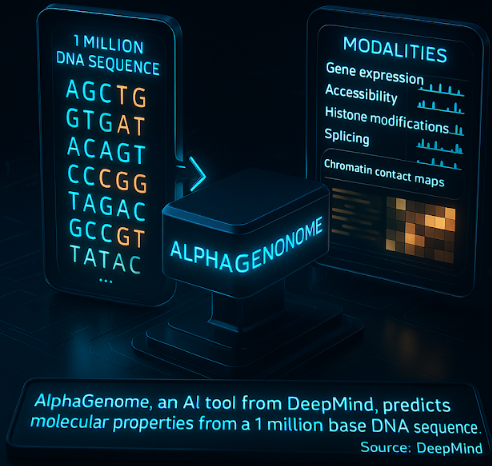AlphaGenome: Illuminating DNA’s Dark Matter with Artificial Intelligence
Google DeepMind’s AlphaGenome analyzes million-base-pair sequences to predict gene activity, chromatin accessibility, RNA splicing, and the regulatory impact of non-coding mutations.
Source: MIT Technology Review · Feature · AI × Genomics
The human genome is often described as life’s blueprint. Yet despite decades of research, the vast majority of it remains poorly understood. Only about 1–2% of DNA directly codes for proteins. The remaining 98%, often referred to as the “dark matter” of the genome, has long puzzled scientists.
Now, Google DeepMind has introduced AlphaGenome, a next-generation artificial intelligence system designed to unravel this hidden code. By applying deep learning to vast stretches of DNA, up to one million base pairs, AlphaGenome offers unprecedented insights into how non-coding regions of the genome influence biology.

Beyond Protein-Coding DNA
Traditional genomics research has focused on protein-coding sequences. AlphaGenome goes further, analyzing regulatory and structural aspects of the genome that determine how genes function. The model can predict:
- Gene activity – determining when and where genes are switched on or off
- Chromatin accessibility – identifying which DNA regions are open for cellular interactions
- RNA splicing – forecasting how RNA molecules are cut and rearranged
- Regulatory impact – revealing how non-coding mutations influence gene regulation
By capturing these complex processes, AlphaGenome allows researchers to probe the hidden regulatory architecture of the genome, an area central to understanding human health and disease.
Why This Matters
Many genetic diseases arise not from mutations in protein-coding genes, but from subtle errors in the genome’s regulatory framework. Non-coding mutations can disrupt when and how genes are expressed, leading to conditions ranging from developmental disorders to cancer.
AlphaGenome provides a powerful tool to:
- Improve genetic diagnostics for both rare and common diseases
- Uncover the role of non-coding variants in disease mechanisms
- Advance precision medicine by tailoring treatments based on regulatory landscapes
As highlighted in MIT Technology Review, this marks a significant step toward solving one of biology’s enduring mysteries: What is the hidden majority of our DNA really doing?
Limitations and the Road Ahead
While AlphaGenome represents a major leap forward, it remains an evolving research tool. Predictions generated by the model require rigorous laboratory validation. Moreover, DNA behavior is influenced by context (cell type, environmental signals, and developmental stage) factors that remain challenging to model computationally.
Nonetheless, AlphaGenome demonstrates how AI and genomics are converging to unlock biological complexity. By illuminating DNA’s dark matter, DeepMind is pushing the boundaries of what is possible in biomedical research and paving the way for transformative discoveries in the years ahead.
Source: MIT Technology Review





